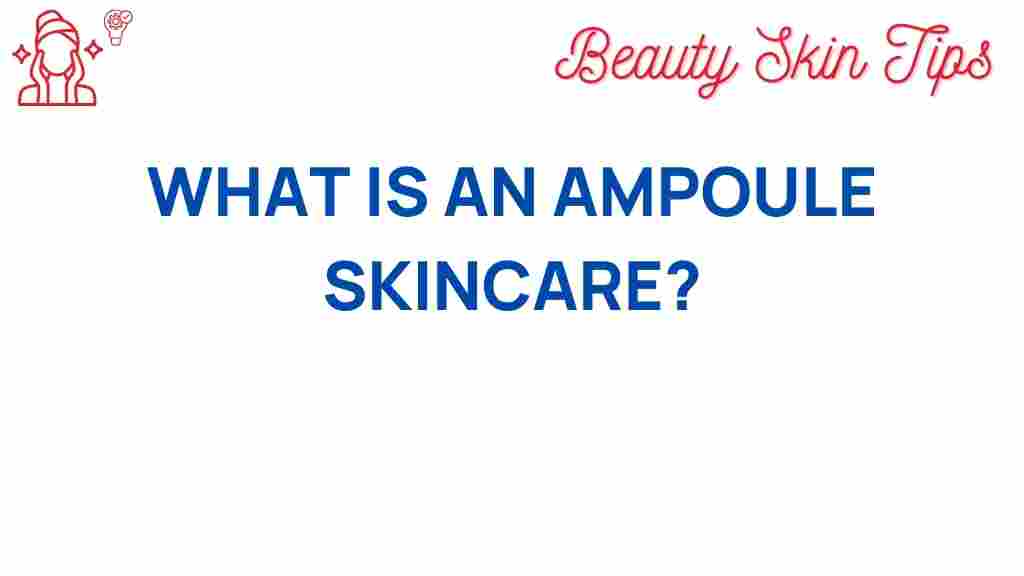Ampoule Skincare: Unveiling the Mystery
In the ever-evolving world of skincare, there are countless products and ingredients vying for our attention. One such product that has garnered significant popularity in recent years is the ampoule. But what exactly is an ampoule in skincare, and how can it benefit your beauty routine? In this comprehensive guide, we will delve into the intricacies of ampoule skincare, its uses, benefits, and how to incorporate it into your regimen effectively.
What is an Ampoule?
Traditionally, an ampoule is a small sealed vial that contains a sterile solution. In the context of skincare, ampoules are concentrated formulations designed to deliver potent ingredients directly to the skin. They typically come in small glass vials or dropper bottles, ensuring that the product remains uncontaminated until it’s ready for use.
The Purpose of Ampoule Skincare
Ampoules are considered a luxurious addition to any skincare routine, and they serve several purposes:
- Targeted Treatment: Ampoules are formulated to address specific skin concerns, such as acne, dullness, or signs of aging.
- High Concentration: The active ingredients in ampoule skincare are often more concentrated than those found in regular serums or moisturizers.
- Boosting Benefits: Ampoules can be used to enhance the effects of other skincare products, providing an extra boost when your skin needs it most.
Common Ingredients Found in Ampoules
One of the most intriguing aspects of ampoule skincare is the variety of formulations available. Here are some common ingredients you might encounter:
- Hyaluronic Acid: Known for its incredible hydrating properties, it helps retain moisture in the skin.
- Vitamin C: A powerful antioxidant that brightens the skin and helps reduce signs of aging.
- Peptides: These help promote collagen production and improve skin elasticity.
- Niacinamide: Great for minimizing pores and improving skin texture.
- Botanical Extracts: Natural extracts can soothe and nourish the skin, providing additional benefits.
How to Incorporate Ampoule Skincare into Your Routine
Integrating ampoules into your skincare regimen can be straightforward. Follow these steps to maximize their benefits:
Step 1: Cleanse Your Skin
Start with a gentle cleanser to remove any impurities and makeup. A clean canvas is essential for the ampoule to penetrate effectively.
Step 2: Tone Your Skin
Using a toner can help balance your skin’s pH and prepare it for the following products. Look for alcohol-free options to avoid drying out your skin.
Step 3: Apply the Ampoule
After toning, apply the ampoule. Here’s how:
- Dispense the recommended amount (usually 1-2 drops) into your palms.
- Gently press the product into your skin, focusing on areas that need extra care.
- Allow it to absorb fully before moving on to the next step.
Step 4: Follow with a Serum or Moisturizer
After the ampoule has absorbed, proceed with your regular serum or moisturizer. This step helps seal in the benefits of the ampoule.
Step 5: Use Regularly
For optimal results, use ampoules regularly. Depending on your skin’s needs and the specific product, this could mean daily use or a few times a week.
When to Use Ampoules
Ampoules can be used at any time, but consider using them:
- When your skin looks dull or tired.
- During seasonal changes, when your skin may need extra hydration.
- Before a big event or occasion, to give your skin a boost.
Troubleshooting: Common Issues with Ampoule Skincare
Here are some common issues users might encounter when using ampoules and how to address them:
Issue 1: Skin Irritation
If you experience redness or irritation after using an ampoule, it could be due to a specific ingredient. To troubleshoot:
- Stop using the product and observe if the irritation subsides.
- Patch test new ampoules before full application.
- Consult with a dermatologist for personalized advice.
Issue 2: Not Seeing Results
Sometimes, users may feel disappointed with the results. Consider the following:
- Ensure you’re using the ampoule consistently and as directed.
- Be realistic about the expected timeline for results; some benefits take time.
- Combine with a comprehensive skincare routine for better outcomes.
Issue 3: Product Expiration
Ampoules typically have a shorter shelf life once opened. To avoid waste:
- Check expiration dates before purchase.
- Store unused ampoules in a cool, dry place.
- Use opened ampoules within the recommended time frame (usually a few weeks).
The Benefits of Ampoule Skincare
Now that we’ve explored the basics of ampoule skincare, let’s discuss the numerous benefits these concentrated formulations can offer:
Enhanced Hydration
Many ampoules contain hydrating ingredients like hyaluronic acid, which can significantly improve skin moisture levels. This is especially beneficial for those with dry or dehydrated skin.
Targeted Solutions
With formulations tailored to specific skin concerns, ampoules can provide targeted solutions, whether you’re looking to reduce fine lines, brighten your complexion, or fight acne.
Quick Absorption
The lightweight textures of ampoules allow them to absorb quickly, ensuring that your skin receives the active ingredients without feeling heavy or greasy.
Compatibility with Other Products
Ampoules can easily be integrated into your existing skincare routine, working harmoniously with serums, moisturizers, and other treatments. For more information on blending various products, check out this guide.
Conclusion: The Future of Ampoule Skincare
Ampoule skincare offers a unique approach to achieving radiant, healthy skin. With their concentrated formulas and targeted benefits, ampoules can enhance your beauty routine and address specific skin concerns effectively. Whether you’re looking to hydrate, brighten, or rejuvenate your skin, incorporating ampoules into your regimen may be just what you need.
As with any skincare product, it’s essential to choose ampoules that suit your skin type and concerns. Remember to pay attention to your skin’s response and adjust your routine accordingly. With the right approach, ampoule skincare can unlock the secret to glowing skin and elevate your skincare game.
For additional resources and product recommendations, you can visit this website to explore more about ampoules and their benefits.
This article is in the category Skincare and created by BeautySkinTips Team
